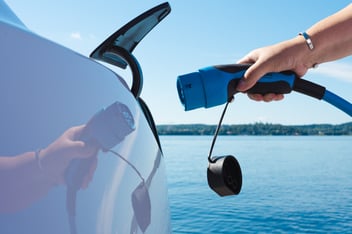
Industry Leaders EVA Global and United Call Centers (UCC) Collaborate to Support Electric Mobility Ecosystem Amid EVA Global’s Bankruptcy
November, 2024 /
Now more than ever before, we are seeing how quickly nature can heal and self-cleanse when human activity and interference is drastically reduced. Pollution levels have fallen around the world as harmful production lines are considerably cut, and polluting vehicles remain stationary. Our air, oceans and rivers are cleaner and clearer, and wildlife is thriving whilst enjoying the absence of humans. Our newsfeed is full of footage showing animals roaming the streets of big cities that would normally host congested traffic jams producing dangerous amounts of carbon monoxide and other pollutants. Meanwhile, research shows that areas suffering from higher pollution levels have been hit hardest by fatalities resulting from Covid-19. This virus targeting our respiratory system has demonstrated the urgent need for protecting our health from the long-lasting damage of breathing in polluted air – day in and day out.
From all the devastation caused by the Covid-19 pandemic, the much-needed break enjoyed by our natural environment is the silver lining we should grasp hold of and do what we can to preserve. So, whilst in lockdown, let us all consider:
Carbon brief predicts the pandemic will give rise to the largest annual fall in CO2 emissions of all time. Using five key datasets and projections, notably the entire carbon market output from China, the US and Europe, as well as the Indian power sector and global oil sector, it is anticipated that the global pandemic could result in reducing our global CO2 emissions by 2000m tonnes. This is hugely beneficial to our natural environment, and a very positive step towards achieving carbon neutrality by 2050 as the target set out in the European Union’s Green Deal.
Considering that before the outbreak of the pandemic transport accounted for 25% of pollution in Europe and now, amid the pandemic, the purchase of traditional ICE (internal combustion engine) vehicles has diminished by approximately 55%, drivers have the opportunity of revolutionizing mobility and transport by choosing the more environmentally friendly option for their next purchase: the electric vehicle.
Transport will always form an essential aspect of our societies, moving freely and easily is a foundation of modern life. As more and more charge points pop up around Europe and globally, and as the range of new electric vehicles constantly increases whilst networks facilitate easier and more connected ways for charging on the road, the fears of range anxiety are reassuringly diminishing.
An EV driver not only contributes to a cleaner and more sustainable way of moving, but also benefits from a treasure chest of financial benefits from tax breaks, to a lower cost of general maintenance, and most particularly in that electric is cheaper than oil (in more ways than one).
Ultimately, by opting for e-mobility, we are contributing towards re-shaping transport in the long run and showing a higher demand for investing in clean-tech in the automotive industry and beyond. This is needed for ensuring the long lasting, structural change that is key for reaching our global sustainability goals.

So, returning to that important question:
“What changes can I make to my lifestyle that can help preserve my, our, environment?”
The answer is: a lot. Big and small changes matter. One interesting idea shared by the EVAssist team is a “holiday lockdown”. This would entail people taking one week a year, or even two if you can allow for it, and simply stay indoors – the same way that we have throughout this enforced lockdown. We have seen how well people around the globe have managed to stay in their homes for a prolonged period, without much notice or planning possibilities. If we were to do this more often, with the comfort of being able to plan ahead what kind of environmental benefits would we see in the long run?
What can be said, is that every single reversal of habits that negatively impact the environment is important and our persistence will achieve a long term improvement; whether by implementing a more conscious recycling regime, reducing the consumption of single use plastics, or embracing new transport technologies that reduce our carbon footprint – we should take great pride in every effort. Each of us that participates in a more environmentally conscious lifestyle adds to a growing impact to safeguarding and preserving the health of our environment and the future of generations to come.

November, 2024 /


July, 2024 / News
